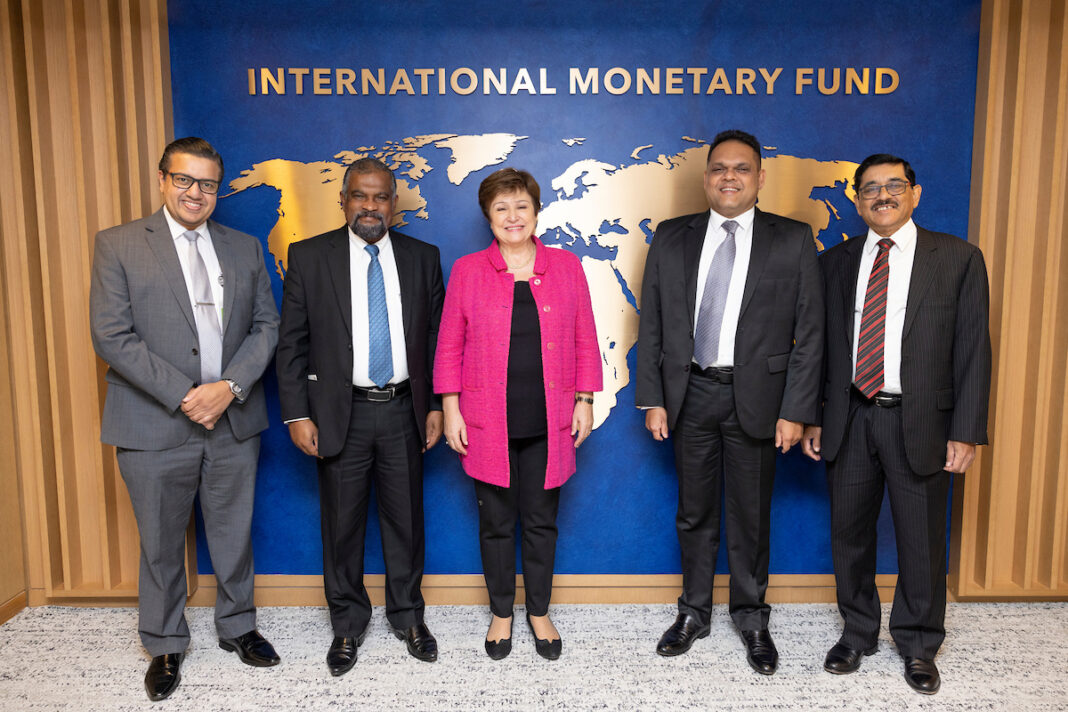Image: IMF welcomed secretary to finance ministry ( 2nd from the left) who refused to obey SC decision to release funds for Local Government election.
Sri Lanka’s Supreme Court has found several clauses in a planned controversial draft monetary law to be ‘capricious and arbitrary’ and against the country’s constitution.
The supreme court has suggested remedies to resolve legal conflicts with the constitution as well as some other laws in the country, including a foreign exchange act.
The law is to be passed as part of an International Monetary Fund’s latest program.
Critics however have warned that the new law does not solve the fundamental problems of anchor conflicts and monetary instability which have plagued the country for over 7 decades and drives central bank into IMF programs.
The new monetary law seeks to institutionalize dual anchor conflicts (operating both monetary and exchange rate policy simultaneously) and to legitimize output gap targeting (printing money or monetary stimulus to boost growth), that have triggered currency crises and defaults in Sri Lanka and other countries which have reserve collecting central banks, critics have warned.
After the bill is passed into law, the central bank is expected to seek authority to print money and generate inflation, perhaps up to 5 percent, as it had done during several years past.
The Supreme Court found multiple clauses against the constitution. One related to the inflation target itself.
According to Section 26 of the proposed bill ” The Minister and the Central Bank shall sign a monetary policy framework agreement with regard to setting out the inflation target to be achieved by the Central Bank.”
ft) If the Central Bank fails to meet the inflation target by a margin determined in lerms of subsections (l) and (3) of this section for two consecutive quarters, the Monetary Policy Board shall submit a report to the Parliament through the Minister, which shall also be made available to the public, setting out-
(a) the reasons for the failure to achieve the inflation target,’
(b) the remedial actions proposed to be taken by the Central Bank; and
(c) an estimate of the time-period within which the in/lation target shall be achieved
Thus, as Clause 26(1) of the Bill does not provide for a proper criterion to address a possible situation where a difference of opinion arises between the Minister and the Central Bank, the said Clause is arbitrary and capricious
It was suggested that “In the even the Minister and the Central Bank are unable to reach an agreement with regard to the inflation target as referred to in subsection (l), the Minister shall place his proposal for the inflation target and that of the Central Bank before the Cabinet of Ministers and the Cabinet of Ministers shall determine the inflation target to be achieved by the Central Bank.”
Clause 28 of the Bill sets out the criteria that should be followed by the Monetary Policy Board if it anticipates an economic disturbance that is likely to threaten the domestic price stability in Sri Lanka or if there are abnormal movements in the price levels that are actually endangering such domestic price stability. Further, the said Clause places a duty on the Monetary Policy Board to inform the Minister if it anticipates any of the situations set out in Clause 28(1) of the Bill.
However, the said Clause is silent on the action/steps that should be taken by the Minister.
The drafters of the Bill should have included such a procedure in the said Clause with the expectation that such situations warrant the intervention of the Government. In the circumstances, the omission to include a provision for the Government to intervene in such instances makes Clause 28 of the Bill arbitrary and capricious.
Court also round that Clause 14(16) of the Bill enables the Governor of the Central Bank to accept and hold other positions. Taking into consideration the duties and functions that are required to be pretrimmed by the Governor of the Central Bank. such a proviso is unwarranted. arbitrary, and capricious, and thereby violates Article 12(1) of the Constitution
The court also suggested deleting a provision where Deputy Governors could be appointed from the outside without any qualifications.
Court has also suggested provisions allowing the President to suspend the Governor pending inquiry.
Central bank employees are to be prohibited from working in a financial institution for three years.
As a large number of financial institutions are coming under the Central Bank, such persons may come across confidential and sensitive information during their tenure at the Central Bank. Further, such a restriction is essential to maintaining the impartiality and integrity of the persons working at the Central Bank” Hence, the absence of such a provision is arbitrary and capricious.
Furthermore, there is no rationale for imposing such a restriction only on the appointed members.
Thus, it is imperative to have a Clause that restricts the Govemor of the Central Bank, Deputy Governors, and employees of the Bank from serving in any capacity for any financial institution until the expiration of a period of three years from the date of such cessation.
The bill had proposed only that appointed members to the monetary board be prohibited from working in a financial institution for one year.
Download the Supreme Court determination from this link.
